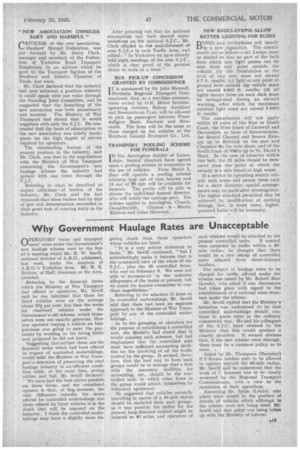Why Government Haulage Rates are Unacceptable
Page 19

If you've noticed an error in this article please click here to report it so we can fix it.
OPERATORS' terms and transport users' rates under the Government's new haulage scheme were to the fore at a meeting which Mr. R. W. Sewill, national director of A.R.O., addressed, last week, under the auspices of A.R.O.'s Yorkshire Area. Mr. R. E. Britton, of Hull, chairman of the Area, presided.
Referring to the financial terms which the Ministry of War Transport had offered to operators, Mr. Sewill said he was informed that those for hired vehicles were on the average about 331 per cent. less than the terms for chartered vehicles under the Government's old scheme, which themselves were not exactly generous. How any operator buying a vehicle on hirepurchase was going to meet the payments by working on the hiring terms now proposed he did not know.
Suggesting that neither these, nor the financial terms which had been offered in respect of controlled undertakings, would fulfil the Minister of War Transport's intention of preserving the road haulage industry in au 'efficient condition while, at the same time, saving rubber and fuel, Mr. Sewill declared : " We have had the best advice possible on 'these terms, and my considered opinion is that, at th, moment, the only difference between the terms offered for controlled undertakings and those offered for hired vehicles is in the death that will be imposed on the industry. I think the controlled undertakings may have a slightly more lin
gering death than those operators whose vehicles are hired.
"It is a very serious statement to make," Mr. Sewill continued, "but I unhesitatingly make it because that is the considered view of the whole of the S.J.C., plus the 48 controlled firms, who met on February 5. We were not able to recommend to the industry acteptance of the terms at present, but we asked the finance committee to continue negotiations." Referring to the selection Of firms to be controlled undertakings, Mr. Sewill said that there had been no separate approach to the Minister of War Transport by any of the controlled undertakings.
As to the grouping of operators for the purpose of establishing a controlled unit, the Ministry had stated that it would consider such schemes, but had emphasized that the controlled unit must have sufficient accounting facilities for the invoicing of all the traffic carried by the group. It seemed, therefore, that the best way to form such groups would be to arrange that a firm with the necessary facilities for accounting, etc., should be the controlled unit; to which other firms in the group would attach themselves by voluntary agreement.
He suggested that vehicles normally travelling in excess of a 40-mile radius should be excluded from such groups, as it was possible the radius for the present long-distance control might be reduced to 40 miles, and operators of such vehicles would be attached to the present controlled units. If control were extended to traffic within a 40mile radius, he thought that there would be a new set-up of controlled units selected from short-distance hauliers.
The subject of haulage rates to be charged for traffic cirried under the scheme was raised by Mr. Robert Barr (Leeds), who asked if any discussions had taken place with regard to the establishment of a national rates structure under the scheme.
Mr. Sewill replied that the Ministry's intention was understood tobe that controlled undertakings should continue to quote rates in the ordinary commercial way. He and his colleagues of the S.J.C. have stressed to the Ministry that this would produce a chaotic situation. It seemed obvious that, if the new scheme went through, there must be a common policy as to rates. •
Asked by Mr. Thompson (Barnsley). if C-licence holders were to be allowed to operate beyond the 60-mile radius, Mr. Sewill said he understood that the work of C licensees *was to be closely reviewed by the Regional Transport Commissioners, with a view to the restriction of their operations.
Answering Mr. Spink (Leeds). who asked what would be the position of drivers of vehicles which although in the scheme were not being used, Mr. Sewill said that point was being taken up with the Ministry of Labour.




















































